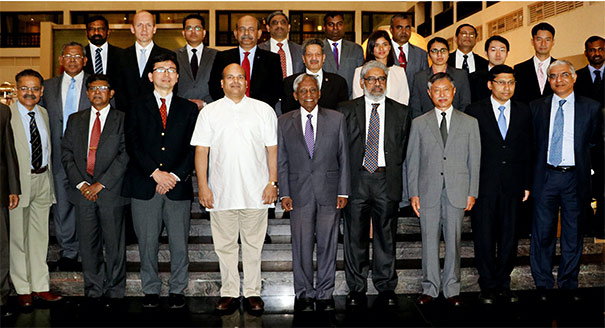Registration
Thank you!
You will receive an email confirming your registration.
As the Indian Ocean re-emerges at the heart of global trade and becomes increasingly integrated with the Western Pacific, the Bay of Bengal is likely to emerge as a critical linkage between the two oceans. Carnegie India, in association with the Pathfinder Foundation, hosted its first conference outside India in Colombo, Sri Lanka. The track 1.5 dialogue sought to enhance regional cooperation among the countries neighboring the Bay of Bengal. The conference was attended by senior government officials and scholars from Bangladesh, India, Japan, Maldives, Nepal, Norway and Sri Lanka.
DISCUSSION HIGHLIGHTS
- Geostrategic Significance: The Indian Ocean region has become a space for strategic competition for major powers, participants acknowledged. In the Indo-Pacific, the Bay of Bengal connects markets and trade across Asia’s fastest growing economies. Participants argued that the region’s long-term economic prospects will likely be driven by the ability of countries such as Bangladesh, Sri Lanka, and Myanmar to take advantage of the economic opportunities offered by states like India and China. The discussion also highlighted the interest of nonresident actors such as Japan engaging constructively in the region. The participants discussed the underlying security implications of connectivity projects in across Asia. Despite being an economic initiative, participants agreed that the Chinese Maritime Silk Road holds strategic implications. Such initiatives introduce competing influences, and the Bay of Bengal community must find a way to benefit from such opportunities and boost connectivity in the region.
- Transportation and Economic Connectivity: The participants discussed economic connectivity as the key driver for developing the Trincomalee port. Speakers noted the role Sri Lanka can play in facilitating growing trade across the Bay of Bengal. They suggested that connectivity should be promoted by sea, air, and road linkages to Trincomalee to support trade through the Bay of Bengal. In addition to developing the Trincomalee port’s sea connectivity, speakers underlined the need for building domestic aviation facilities to boost connectivity within Sri Lanka. In the strategic context too, the Trincomalee harbor would be ideal as a commercial hub and as a center for a regional maritime security architecture focused on the Bay of Bengal, they added. Speakers noted a master plan for developing Trincomalee, supported by the Sri Lankan leadership, could be based on shipping, manufacturing, and tourism.
- Trincomalee Harbor as a Regional Hub: Participants discussed the historical importance of the harbor in the Indian Ocean region, citing examples of its importance for the British imperial Navy and its role in the Second World War. Trincomalee is the second-largest natural harbor in the world, with significant economic and strategic potential. The Liberation Tigers of Tamil Eelam sought to declare Trincomalee as the capital of the independent state they were fighting for. However, speakers said, the strategic potential of the harbor remains untapped since the end of the Second World War. All participants noted the harbor’s marginalization in recent times and emphasized its potential for emerging as one of the key commercial and strategic hubs in the Indo-Pacific. Participants discussed the need for states in the region to take the initiative toward increasing trade within the littoral states, and develop a shared plan for improving connectivity in the region. Participants also welcomed a leadership role from India for initiating regional integration projects.
- Reintegrating the Region: The Trincomalee harbor, while historically important, has lost its relevance in recent years, participants concluded. However, there is now significant momentum for building a Bay of Bengal community and growing sub-regional linkages. As great powers continue to shape politics in the Bay, participants argued that there is an urgent need for states bordering the Indian Ocean to play an active role in shaping the security and economic architecture into a favorable strategic environment. Developing the Trincomalee harbor into an active commercial and strategic hub, they said, could be an excellent starting point.
